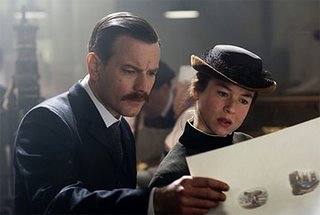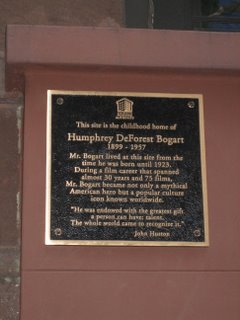the film snob
A cyberspace journal about my experiences as an NYU film school grad student, reviews of current and classic films, film and TV news, and the rants and raves of an admitted (and unapologetic) film snob.
Thursday, December 28, 2006
Wednesday, December 27, 2006
HOLY $%#@!

“Makes film school almost irrelevant.” - Entertainment Weekly
You won't believe me when I tell you what my wife gave me for Christmas.
“There’s not a richer gift . . . for someone ready to experience the wonders of movies beyond Hollywood than this sumptuous set." - Richard Corliss, Time Magazine
I barely believe it myself.
“It’s hard to argue with the artistic significance and historical importance of the great majority of the movies in this volume...these are movies to be returned to again and again.” - Dave Kehr, The New York Times
Never in a million years would I have imagined I'd own this.
“I was speechless . . . it is beyond deluxe.” - Liz Smith
I am speechless and yet babbling with excitement.
“Quite simply the year’s best DVD boxed set.” - Peter Howell, The Toronto Star
What a woman!
“If you’re looking for an instant start for a DVD collection, or a gift that will keep on giving for thousands of hours, here it is.” - Joe Morgenstern, The Wall Street Journal
Perhaps I should just show you what I'm talking about...
“The perfect present.” - Joan Juliet Buck, Vogue
Tuesday, December 26, 2006
Miss Potter

Miss Potter is a film that doesn’t quite work and yet somehow remains charming and even moving regardless.
Beatrix Potter (Renee Zellweger) is something of an aberration in 1902 London. 32 years-of-age and single, she is a virtual outcast, preferring the company of her own drawings to that of suitable, if silly, young men of the proper rank and station. This does not bother her. Quite the contrary. Something of a Victorian feminist, she is perfectly content with her lot in life, a sort of glorified housekeeper to her father and mother so long as she can continue to paint and write.
One day she decides to shop around her work to various London publishers. Her children’s books, filled with talking bunnies and ducks, do not go over well until she meets a pair of bothers, Harold and Fruing Warne (Anton Lesser and David Bamber). Secretly keen on giving their younger sibling Norman (Ewan McGregor) something to do in order to keep him out of their way, they accept to print her book, “The Tale of Peter Rabbit.”
But no one expected Norman to take Beatrix’s work as seriously as she did, nor did anyone imagine how enthusiastically children would snatch up her books. Almost overnight, Beatrix Potter finds herself very famous, very rich, and very much in love with Norman. Disapproving of her artistic endeavors, Beatrix’s strait-laced, upper-crust parents certainly do not appreciate her relationship with a man so below their social station. While Beatrix’s father understands her more than he is often willing to let on, it is to her mother that Beatrix is a mystery and a deep disappointment.
This would have been and perhaps should have been enough for a wonderful film. However, the filmmakers decided to branch out beyond this chapter of Beatrix’s life, encompassing many of the years that followed. The latter half of Miss Potter covers a shattering tragedy in Beatrix’s life and the burgeoning environmentalist’s efforts to secure land in England’s Lake District in order to keep it out of the hands of greedy developers. What does this have to do with the Peter Rabbit? Not much. The problem with this latter bit is that it feels tacked on, the over-reaching efforts of a screenwriter who simply couldn’t exclude any gem about his character’s life. While exhaustively researched, the film punches all the historical highpoints at the expense of any driving excitement.
Miss Potter took decades to get made. Much as Beatrix Potter herself had a devil of a time getting her “bunny book” published, it couldn’t have been much easier pitching a “bunny movie.” And then came Finding Neverland, the luminous tale about J.M. Barry and the inspiration for “Peter Pan.” A film of whimsy and delightful flights of fancy, Miss Potter attempts to ride the coattails of Neverland’s esthetics. And it works, albeit only intermittently.
And that is perhaps the oddest part of all. Director Chris Noonan (helmer of the overwhelmingly charming Babe) chose Miss Potter to break his 11-year sabbatical from filmmaking. So it comes as something of a surprise that, after making the most endearing film ever made about talking animals, Potter’s drawings that come to life aren’t featured more prominently and given more room to run. There was a lavishly charming film in there, just waiting to break out, but it is never given the chance.
It must also be said that Renee Zellweger is miscast as Potter. Not woefully, scandalously miscast; she simply struggles to make Beatrix credible. While her cherubic features take us half the way, her visible efforts to “play British” shatter the illusion and we never really buy into her in the role. Instead of Zellweger, it’s her co-stars who really impress. McGregor is smooth and charming. But it is Emily Watson as Norman’s sister, Millie, who steals the show as a feminist firecracker Jane Austin would have envied.
And so it is, perhaps, amazing that in spite of all these shortcomings and missteps, Miss Potter still succeeds. While it cannot sustain the fairytale enchantment of something like Finding Neverland, Miss Potter is, nonetheless, a worthy and sweet, middle-of-the-road biopic.
Beatrix Potter created a series of books and characters that are as beloved today as they were a hundred years ago when she first dreamed them into existence. While the filmic version of her life bites off more than it can satisfactorily chew, it provides just the sort of pleasant diversion for which the season calls.
The Pursuit of Happyness

Many people mistakenly believe Thomas Jefferson championed the self-evident truths of life, liberty and happiness. But that is not what the author of the Declaration of Independence wrote. He stated that all human beings had a right to the pursuit of happiness. Happiness itself is not guaranteed, but everyone, he asserted, has the inalienable right to seek it out any way they can.
This is a distinction that Chris Gardner (Will Smith) understands all too well. A door-to-door salesman of expensive medical scanners that were promised to move like hotcakes but now seem to do little more than drag him down, Gardner barely ekes by with enough money to support his increasingly distant wife (Thandie Newton) and young son (Smith’s own son, Jaden).
It isn’t long before his wife leaves him, several of his machines are stolen, and he loses his apartment. Gardner applies for and against all odds, wins an extraordinarily competitive internship at the stock brokerage firm, Dean Witter. But the six-month internship is unpaid, and in the end, only one intern will win a position with the company. Gardner and his son sleep in homeless shelters and subway restrooms. Each day seems to bring new and insurmountable problems. He can barely feed and house himself, let alone fulfill the requirements of his internship. If he doesn’t win the coveted single slot awarded at the end of the internship it will all be for naught.
Gardner’s life is lived in the crosshairs. It seems like every other scene in The Pursuit of Happyness takes place on a street as Gardner threads his way precariously through traffic, barely (and sometimes unsuccessfully) dodging oncoming cars. The scenes become a visual metaphor for the gauntlet that is Gardner’s life.
Any screenwriting class that focuses on the traditional, American, three-act script, will instruct students to construct the narrative flow in such a way that tension builds and retreats. At the end of the first and second acts, crises’ will imperil our heroes and hold the audience’s attention into the subsequent acts, where, at the finale, all will be resolved. Obviously, screenwriter Steven Conrad never took that class. The Pursuit of Happyness is not an easy film to watch. It is a relentlessly, methodically, unyieldingly grim film. You will walk out of the theater numb and exhausted. While the Promised Land is indeed the ultimate destination, this film is about the journey through hell in order to get there. Few films so convincingly portray the titanic struggle that some people face day in and day out just to survive.
Italian director Gabriele Muccino makes his English-film debut with a movie that is earnest and filled with conviction. It is not, empirically, an enjoyable movie, simply because it is so difficult to watch. But it is a good movie. Charges that it is sappy and after-school-special sentimental are false. Just because a film affects one’s emotions does not mean it preys upon them. While it is true that the story, with its trials of Job, could flop over into melodrama, Smith keeps it very personal, very authentic. Initially the real Chris Gardner, whose life the film is based on, reacted to the casting choice with skepticism. One can’t imagine why. A versatile and powerful actor, Smith nails his character, playing him with the perfect balance of expectation and despondency. He deserves his Golden Globe nomination. Son Jaden is cute as a button and utterly believable. The interplay between the two naturally feels genuine.
I’ll not reveal the end here. Though the monolithic climb and crucial summit may strike some as cinematic hocus-pocus, the film takes few liberties with the real Gardner’s autobiography. When the audience applauds at the end as they have been in theaters nationwide, feel free to join in. After all, it’s Christmas.
Wednesday, December 20, 2006
Transformed Thinking?

Another teaser just went online for the new Transformers movie.
Why the heck do I want to see this? Why does this teaser actually appeal to me? Why, God, oh why am I actually interested in catching a Jerry Bruckheimer/Michael Bay movie that I know I'm just going to regret afterwards?
I feel so dirty.
Tuesday, December 19, 2006
Mad About Mad About You

I'd forgotten how truly great this show was.
I used to love watching it in college but lost track of it when I moved overseas (and when, apparently, it began its final seasons decline). Now, thanks to Nick-at-Nite, I get to catch up with the Buchman's each and every day.
The gentle humor of Paul and Jamie's young marriage in New York City has always been terribly funny and endearing, and the show has 22 Emmy nominations and 10 statuettes to prove it. Paul Reiser is one of the best situational funnymen in the business and the show introduced us all the exceptional talent of Helen Hunt.
You know you have a good show on your hands when you can't watch an episode without thinking they read your mail.
Delightful.
Monday, December 18, 2006
Intellectual Masturbation and Other Fun Phrases

Well, that's it. My first semester of graduate school is officially over. I ran my completed final papers down to the school Friday night and with that, washed my hands of this semester.
As you may recall, a few weeks into this semester I began bemoaning what can only be described as the program's deep and persuasive intellectual masturbation. I was really growing concerned that, while a theoretical discipline, my entire NYU experience was going to amount to nothing more than preaching amongst the choir and studying nothing that would impact or affect the greater world of filmmaking.
A couple thoughts on that score...
As the semester went on, I began growing less and less concerned about it. It's not that my fears were unfounded (more on that in a moment); I simply began to realize that part of what I was experiencing was probably little more than retraining my mind to understand the vocabulary and cadence of a discipline I hadn’t engaged in for several years. Once the immersion was complete, the most prickly of my concerns vanished.
My Film Form and Film Sense class really settled into a comfortable rhythm and ended especially well as the final weeks were spent studying one of my favorite filmmakers, Orson Welles. The latter half of Film History and Historiography was fascinating as we were forced to confront the idea of nationalism in cinema and the manner in which film reflects both the way a country is and the way it wishes it could become or appear.
If I and everyone else in the program have one massive, festering, angry bone to pick with NYU, it's that Cinema Studies has absolutely no interaction whatsoever with the Cinema Production students upstairs. There is a huge gulf that neither side seems to care enough about to bridge, if they even notice the problem in the first place. There is no way for Cinema Studies students to get some hands-on training, nor can Production students learn anything academically about the very art form they are learning to craft. The technical and the theoretical are kept absolutely separate and I think this is not only deeply disappointing, it is also irresponsible. Some schools have begun to integrate these programs. NYU, a paradigm among film schools, is woefully behind the curve here.
I realize now that the school will not change, or at least not in time for me to benefit from it. If I want to get to know the students who will be tomorrow's great directors (and even actors), I have to be proactive. Near the end of the semester, I began to spend some more time on the Production floors and come January, I have decided to throw my hat into the ring and volunteer my time on various student and independent films, helping out in any way I can. An enigma in my own program since I want to pursue elements of production myself after graduation, I see this as a way to start in the right direction.
It should come as no surprise then that my favorite class of the semester was Script and Narrative Analysis, in which I wrote a screenplay first act and studied the construction and composition of a good script. Not only was the professor captivating and the work engaging, the class had the perfect balance of theory and action.
And now I'm settling down to a month's vacation. I hope to get a paid internship soon with Sony Pictures or another production outfit here in New York that can give me one more leg up on my future, to say nothing of helping pay for the extraordinary absurdities of living in this wonderful but suffocatingly expensive city!
I'll obviously have a lot less to talk about over the next few weeks, but have decided to post some thoughts soon about some of the beautiful and profound films I've had the opportunity to see since the program began.
Until then, have a wonderful Christmas…
Friday, December 15, 2006
Tease Harder

The new Live Free or Die Hard teaser was just leaked online (in, what I'm convinced, is a publicity stunt). Check it out here.
Part of me is horrified because the entire thing looks like one massive, Bruckheimer-esque explosion, but I am going to reserve judgment if for no other reason than I like Len Wiseman's (the Underworld films) style. Plus it has Justin Long. And it can't be worse than Die Hard with a Vengeance.
Uncoupled

One of the wonderful things about having a DVR is that you can program it to search and find shows you like and record them any time they come on.
While scanning the TV Guide channel a month or so ago, we stumbled upon repeats of the series, Coupling, on the local PBS station. A staple of their Friday night line-up, Coupling also became a staple of our week.
This is, of course, the British version of the show, not the four-episode-and-then-cancelled American version. Having never seen the American version, I can only judge it based on its run which is obviously abysmal.
And I can imagine why.
A show about sex, the British version tackles the subject as any good English comedy would—with nuance, subtext, understatement, irony and innuendo. It's not about what you talk about, it's about what you imply. I am certain the American version attacked the subject with all of the subtly of Dr. Ruth hyped on caffeine and well deserved its axe.
And now, it seems, our Friday night import is gone as well. When it didn't record last week, we chalked it up to a holiday fluke. But when the same thing occurred this week, we knew something was up. A check of the PBS station's website and it's nowhere to be seen.
Dang it. And I was just starting to learn something.
Thursday, December 14, 2006
Some Immediate and Reactionary Impressions to the Golden Globe Nominations…

The 64th Annual Golden Globe Awards Nominations are out today. Too bad that at times they look more like the brainless People’s Choice Awards.
I don’t take that much issue with the Motion Picture section, though there is some fascinating stuff there:
Leonardo DiCaprio is nominated twice in the Best Actor category as is Clint Eastwood in the Best Director category!
Of the Best Foreign Language Film category—something that should be reserved for genuinely foreign films—two American productions, “Apocalypto” and “Letters From Iwo Jima” are included. Shame on you Globes.
No, it’s the TV section that really chaps my hide:
Best Drama Series continues to laud “24” and “Lost” (which didn’t deserve a nod this year) but doesn’t include such stellar shows as “The Wire” or “Battlestar Galactica”!?
Best Comedy Series doesn’t acknowledge “How I Met Your Mother", easily one of the funniest things on TV and likewise ignores the absolutely hilarious Neal Patrick Harris in the Best Performance category.
Lets hope the Emmys set some of this right.
Doubtless I'll have further impressions later, especially as I give the list a more than cursory reading, but for now it's back to my finals...
Friday, December 08, 2006
Final-ly

Finals are in full swing. Nearing completion actually.
Script and Narrative Analysis, for which I turned in a 37-page, first act of my screenplay, is submitted and done. I posted a bit more on this subject here.
For my Film History and Film Sense midterm, I wrote a paper on the editing in Akira Kurosawa’s Seven Samurai. For my final, I’m putting the final touches on an analyzation of the James Bond film, Goldfinger, with an emphasis on focalization, the male gaze, female objectification and voyeuristic scopophelia. I figured I’d choose a “fun” film instead of a “serious” film, and it’s been a joy to write. After all, patriarchal objectification of women in James Bond practically writes itself.
For Film History and Historiography, I’m following up my midterm, which focused on propaganda films and the myth of nationalism in cinema with a longer paper that uses that as a starting point to jump off into how countries take history—which has proven to be far more malleable than anyone ever dreamed possible—and reshape it after the fact, often decades or centuries after the fact. As frightening a premise as it may be, many people understand history through the lens of their entertainment. And that entertainment has the ability to alter the past, or, more specifically, our perception of that past. Given enough time, how will it be possible to separate the fact from the fiction?
My last class is this Tuesday and by Friday, all my papers will be in. Then comes a Christmas holiday of..well, I don’t know what, actually. That’s both an uncomfortable and sublime prospect.
Thursday, December 07, 2006
Screening the Screenplay

Today was the day. Printing out enough copies of the screenplay for the class, I assigned the various roles to my fellow students and we read through the piece. Afterwards the professor offered his critique. It was both an exhilarating and intimidating process.
Overall, I am very satisfied. I was complimented highly on my writing and told I have an absolutely fantastic ear for dialogue. Too good in fact. So good that I prattle on and on with it when I should just make my point and shut up.
I frequently have the same problem when writing papers—I never have a hard time making the required pages; I have problems staying below them. My wife loves to edit my papers and excise vast portions of my work while I, heartsick, mourn the loss of the poor little words to which I gave birth and then abandoned to a fate worse than death. It’s a sickness. So is my melodrama. I am taking injections.
Everyone really liked the story and the imagery, but as it is such an expository piece, it’s a struggle to keep things interesting and maintain narrative velocity when you have so much information that needs to be presented. Less talk, more action, or more precisely, more action while talking. The characters could do with more rounding out, more personality, more nuance. And, while it was recommended that certain scenes be shortened, I was encouraged to enlarge others.
Now that it’s over, I have to say that it was a fantastic experience and a whole lot harder than I ever anticipated (the writing, not the presenting). Despite that fact that all first scripts are rubbish and Hollywood is currently writing this exact same story without me, I am going to finish the other two acts. For my own edification, my own practice, and who knows, my own future…


